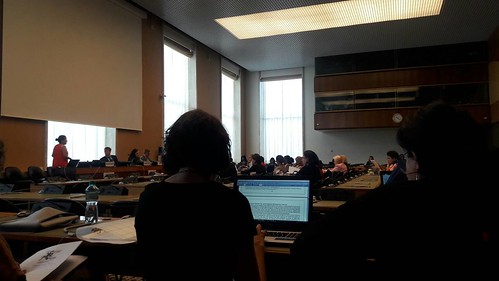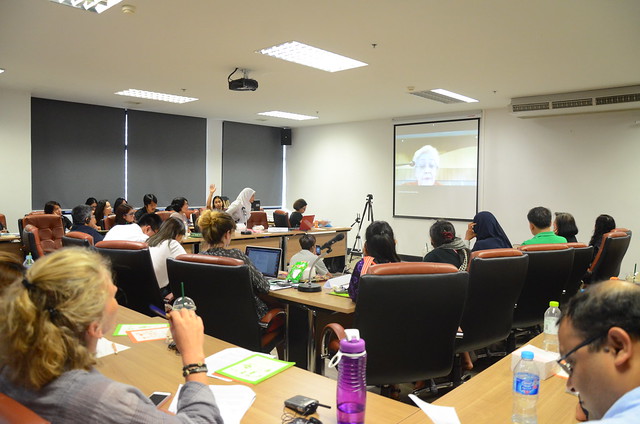Under the current military regime, women suffer injustice and human rights violations significantly more than men due to a lack of legal protection and social discrimination, according to women’s rights reports to the UN.
On 4 July 2017, representatives of Thai women’s rights NGOs read a statement on the Convention on the Elimination of All Forms of Discrimination (CEDAW) at UN headquarters in Geneva. The statement argued that discrimination against women in Thailand still exists on many levels, even though it is 32 years since the country ratified CEDAW.
The statement also claimed that since the 2014 coup, the fight against gender discrimination has become even more difficult. Though the junta approved the Gender Equality Act in 2015 with the aim of improving women’s rights, other legal mechanisms, such as martial law, Section 44 of the Interim Charter and junta orders, threaten women’s fundamental rights.
“We are concerned by the fact that the state uses security strategies [as a pretext] to suppress the freedom of expression of women and others in society. Also, the culture of impunity and systemic corruption lead to further discrimination and violence against women. The patriarchal system is still deeply rooted in Thai society,” read the statement.
The next day, a group of women’s rights NGOs hosted a public forum at the Political Science Faculty of Chulalongkorn University. The UN review of Thailand’s compliance with CEDAW was live-streamed from Geneva, followed by a reflection session by women’s rights advocates from various fields. The organisations involved deal with the rights of sex workers, ethnic minorities, domestic violence, female inmates and migrant workers among others.

CEDAW session in Geneva
Sex workers: lack of legal protection
Female sex workers usually experience human rights violations committed by police officers. During the past six months, there have been 19 cases where officers pretended to be customers and had sex with workers before arresting them. Over 200 workers have been arrested by this controversial method.
Chatchawan Mueangchan from the Empower Foundation said that as prostitution is illegal in Thailand, the authorities are able to take advantage of sex workers. The lack of legal protection also prevents workers from accessing basic welfare services and from serving as witnesses in human trafficking lawsuits.
Thissadee Sawangying from the Health and Opportunity Network urged Thailand to abolish the Prevention and Suppression of Prostitution Act, enacted in 1996, in order to create better working conditions for sex workers.
“We’re pushed into a grey area because of the Prevention and Suppression of Prostitution Act. The ambiguity in law enforcement puts sex workers at a disadvantage, from both pimps and law enforcers. Plus, they are doubly victimised and labelled by local media,” said Thissadee.
Ethnic minorities: rights to live with forests
In 2014, the junta issued its Order 66/2014 to suppress deforestation. The order has led to numerous prosecutions against ethnic minorities who have lived in the forests for generations. Those prosecuted are women more often than men.
According to Kanlaya Chularattakorn from the Indigenous Women Network of Thailand (IWNT), ethnic minority females already suffer from stereotypes that they are involved in the drug trade, human trafficking and illegal land encroachment. The junta’s order therefore has pushed their lives into even further hardship.
Katima Leeja, an ethnic minority woman, explained that the junta order is a problem not only to women, but to their entire families. She added that the government should grant local people the right to manage and benefit from local resources, rather than expelling them from their homeland.
“Order 66/2014 has taken away our farmland. The impacts are not only on women but the whole family. [The authorities] confiscated our land and wood for building houses. We live with the forests but can’t benefit from the forests. How can we send our children to school? How could parents even live? In addition, we have been prosecuted. The laws don’t go along with our way of life at all,” said Katima.
Domestic violence: women’s rights undermined by family
Busayapa Srisompong said that the 90 per cent of domestic violence victims in Thailand are female but the legal system cannot provide them with proper protection. Thailand’s Domestic Violence Victim Protection Act tries to preserve the institution of the family, and at the same to protect victim’s rights, which, according to Busayapa, is a contradiction.
The act allows victims to compromise and drop the prosecution on a voluntary basis. Law enforcement officers in many cases convince victims to drop prosecutions. Even in the case of divorce, officials usually try to convince women to remain in a relationship that they want to leave.
Busayapa added that domestic violence should not focus only on spouses. In many cases, female migrants who work as housemaids are violated inside homes without any legal protection.
“On the migrant workers issue, I’d like to focus on domestic workers. Does the Domestic Violence Victim Protection Act include these people? Migrant workers run the highest risk of being abused [but] they’re not clearly included in definition of family members and not protected under the labour laws either,” emphasised Busayapa.
Female inmates: right to healthcare
Thiprachaya Suphanichsirisakul from the Fairy Tell group said that work to promote inmates’ rights is difficult as prison regulations prohibit inmates from revealing problems inside prison to the public. However, the biggest concern of her group is health conditions for female prisoners.
“The diagnosis of inmates’ health is not thorough. There is only an initial external health check when inmates arrive at the prison. Internal health checks are only intended to search for prohibited stuff (like drugs), not a legitimate health check,” explained Thiprachaya.
She added that sick inmates will be detected only when their symptoms are obvious but the chance of seeing a doctor is in any case low. Only emergency or life-threatening cases have a high chance of reaching proper doctors. Those who are not allowed to see doctors only receive paracetamol, painkillers and antibiotics.
“In my own case, my tooth was broken for six months but I never saw a dentist. All I got was painkillers,” stated Thiprachaya.
Female human rights defenders face intimidation from state and corporates
Sirikan Charoensiri from Thai Lawyers for Human Rights pointed out that the junta and the private sector have perpetrated harsher intimidation against human rights defenders. One of the tactics, increasingly used after the coup, is to file lawsuits against them. The laws that are commonly used include the defamation law, the sedition law, the Computer Crimes Act, and junta orders.
Apart from legal intimidation, the assassination of human rights defenders also occurs occasionally but the murderers and those who hire them are less likely to be prosecuted, adding that female human rights defenders suffer twice as much as men as most of them have to take care of their children as well.
“A female member of the Southern Peasants’ Federation of Thailand was murdered but [the case] is proceeding very slowly. This proves that the Thai state is failing and is not serious about bringing the culprits to justice,” said Sirikan.
The reflection session at Political Science Faculty




